Asian Virginsbower Growing & Caring Guide
Written by Maggie
Feb 06 2023
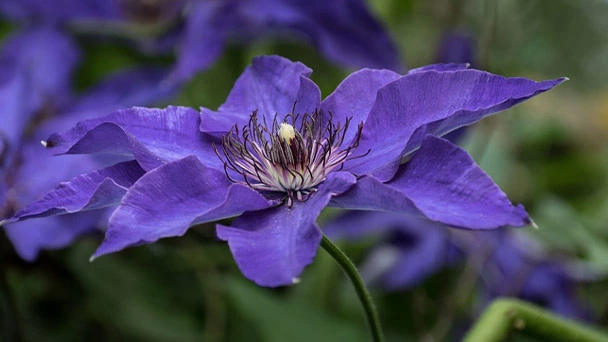
When we grow and care for Asian Virginsbower, the selected soil is mainly mixed soil of 3 parts peat, 1 part perlite, 1 part matrix and 3 parts garden soil. In the period of new bud germination, the fertilizer is mainly compound fertilizer. In April or June, phosphate and potassium fertilizer is applied again, and the water is watered once or twice a week to keep the basin soil moist. The following are growing Asian Virginsbower care.
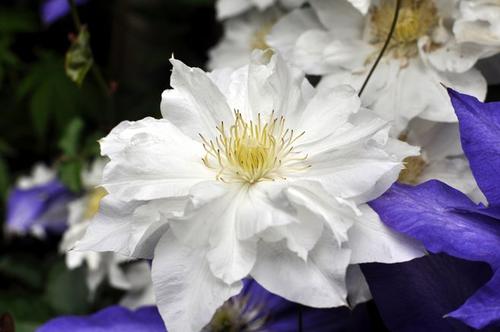
Asian Virginsbower Info
Most Asian Virginsbower are deciduous or evergreen grass vines, flowering from early spring to late autumn (there are a few winter flowering varieties), fruiting in summer. There are several species, varieties and their varieties and hybrids, which can be cultivated for ornamental use in gardens. Asian virginsbower enjoys the reputation of "the queen of vine flowers". The flowering period is from summer to autmn. The flower color is generally white and the flowers have a fragrant smell. Roots and whole grass are used as medicine. Diuresis, qi purge, blood circulation and pain relief. It is used for urination, abdominal distension and stool closure.External use for joint swelling and pain, insect and snake bite.Read More: Asian Virginsbower (Clematis Florida) Profile: Plant Facts
How to Grow & Care for Asian Virginsbower
Sun Requirements
Sunlight is preferred by asian virginsbower vines. While some varieties will tolerate part sun (3-6 hours/day), the majority need at least six hours of sun to bloom. A common saying for clematis is to "keep their faces in the sun and their feet cool."
Soil
Fertilizers and loose soil can make Asian Virginsbower grow more exuberant. Fertilizer, loose and arable slightly acidic sandy soil should be selected for cultivation. In pot cultivation, 3 parts of peat, 1 part of perlite, 1 part of matrix and 3 parts of garden soil can be mixed into culture soil, and some bone meal particles can be put in the pot bottom as the base fertilizer.
Fertilizer
After applying basic fertilizer, Asian Virginsbower should also ensure sufficient nutrients in the middle growth stage. When it's new buds are about to grow, it can apply compound fertilizer once or twice to promote the flourishing growth of plants. In April or June, it should apply phosphorus and potassium fertilizer again, mainly thin fertilizer, to effectively promote flower bud differentiation.
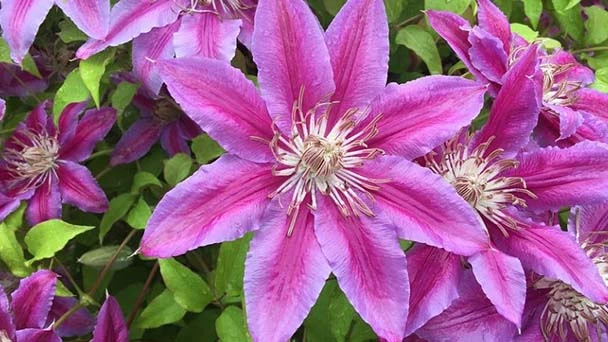
Moisture
Asian Virginsbower do not like to dry out and do prefer consistent moisture levels. The best way to keep the roots of the clematis cool is to surround it with groundcovers or perennials with shallow roots. The roots will also be kept cool and moist with a 2' layer of mulch.Watering
Water moisture is important when we grow and care for Asian Virginsbower. Asian Virginsbower is sensitive to moisture, watering too much or too little water will lead to Asian respectively Virginsbower roots rotted or stunted growth. In the growing season it can be permeable pour 1 ~ 2 times a week, had better choose in the soil under the condition of dry or not withered time for watering, to control water in winter.
Pruning
Asian Virginsbower grows rapidly, so in order to produce better flowers, it is best to prune Asian Virginsbower regularly. Generally, it should be pruned once a year. After the flowering period, the dead and dead flowers should be cut in time, so as to reduce the loss of nutrients from the plant and make the flowering more exuberant in the next year.
Pruning Asian Virginsbower on a regular basis has a number of advantages, including improved health, easier maintenance, and better air circulation.
But not every clematis is made equal. They will fall into one of three pruning groups based on their bloom time and whether they bloom on "old wood" (last year's growth) or "new wood" (this year's growth). Depending on the group they belong to, you must prune them accordingly.
In general, avoid removing a budding clematis bud when deciding how and when to prune. Clematis vines may need to be pruned at a different time if buds are beginning to form.
Read More: How to Care for Asian Virginsbower Leaves Black Spots & New Buds Wilting
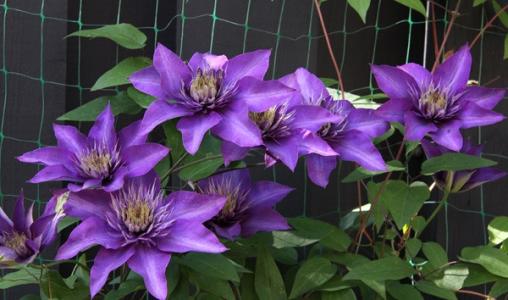
Asian Virginsbower Care in Winter
Asian Virginsbower plants will stop growing and go dormant in winter when the temperature is stable around 10 degrees. During this period, keeping the soil dry, giving the plants light and stopping fertilization can make the plants survive the winter safely. If the temperature can be kept stable above 15 degrees, the plants can grow and flower, and can be cared for in the normal way. The following are Asian Virginsbower care for growing in winter.
Asian Virginsbower is a herbaceous plant of a genus in the Ranunculaceae family, which is also known as Clematis Florida. In winter, if the temperature is below 10 degrees Celsius for a long time, the plants will go into hibernation and stop growing. If you want your plants to bloom normally during the winter, move them indoors to a warmer location and stabilize the temperature above 15 degrees.
When the plants are dormant, they do not need to be watered too much or fertilized. Keep the soil dry or slightly wet. Asian Virginsbower is fond of light, and the light condition is poor in winter, so the plants should be placed in the balcony and other places with better light, so that the plants can supplement the light in sunny weather. Also regularly open the window for air to maintain the indoor environment ventilation.
If the indoor stability can be stable above 15 degrees, the plant can grow normally. During this time, water the plant according to its normal needs and give it water. Asian Virginsbower do not need too much fertilization, the appropriate amount of concentration of the lighter fertilizer solution. Pruning the residual leaves, residual branches, weak leaves and old leaves on the branches can save nutrients, which is conducive to the plant in winter flowering.
We should pay attention to temperature control, water control, fertilizer control and illumination during the winter. Winter temperature is low, to ensure that the temperature is about 10 degrees, so that the plants smoothly through the winter. The plant goes into hibernation in winter, so you can't fertilize it, or the root system will burn. You should also pay attention to watering, if you water too much, the root system will rot. Try to move the plants to a sunny location during the winter.
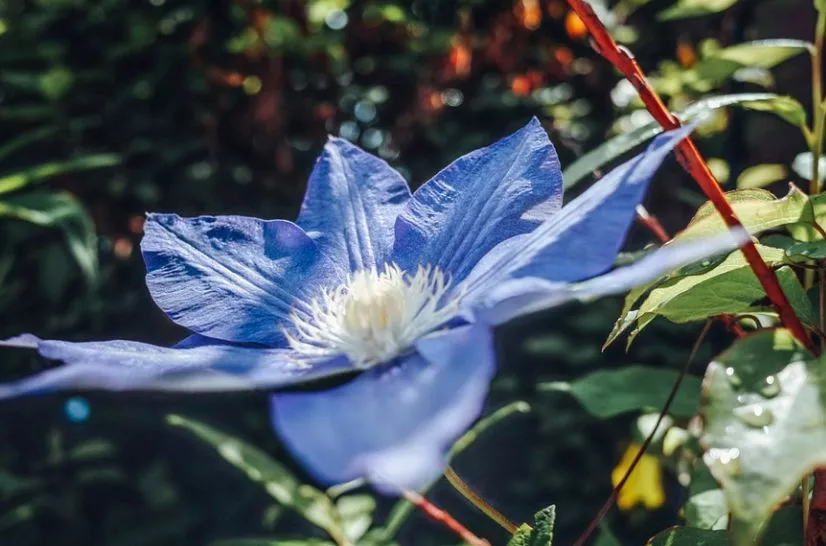
How to Propagate Asian Virginsbower
Asian Virginsbower can be multiplied in a variety of ways to produce additional Asian Virginsbower plants. Taking softwood cuttings is the simplest method.
Propagate Asian Virginsbower by Taking Cuttings
Wait until your Asian Virginsbower has finished blooming for the season. Taking Asian Virginsbower cuttings now is a great idea. Potting or seed starting mix should be moistened and placed in small, sterile (1 part bleach to 9 parts water) plant pots. To get your cuttings started, rooting powder is also helpful.
Next, look for a section of the Asian Virginsbower vine with both old and new wood. The new wood is typically green and more flexible, whereas the old wood is harder and brown in color. You want something right in between the two… a cutting that is "ripe" — but not too woody or too soft.
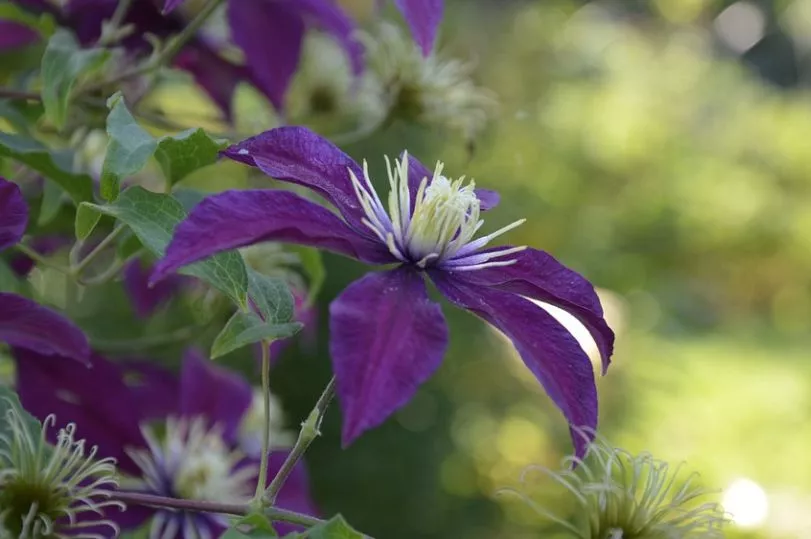
FAQs of Asian Virginsbower Caring
Does Asian Virginsbower Need to Be Cut Back?
Asian Virginsbower shouldn't be pruned until fall. The plant can then use its energy to generate new growth, giving it the strength it needs to survive the winter. Only prune a plant if it is too tall or taking up too much space.
Does My Asian Virginsbower Need Fertilizer?
Yes, fertilizing aids in encouraging blooming and healthy growth. Consider a fertilizer with high nitrogen content, such as 10-10-10, 16-16-16, 20-20-20, or even composted manure. Apply the fertilizer once in the spring and once more in the late summer.
How Do I Keep My Asian Virginsbower Blooming?
If you want your Asian Virginsbower to bloom continuously, it's best to fertilize it every two weeks throughout the growing season (from early spring to late summer) to provide it with the nutrition it needs to bloom continuously for a long time. For your clematis to flourish, you should water it frequently and make sure it is planted in the proper location.
What Happens If I Don't Prune My Asian Virginsbower?
Your Asian Virginsbower won't bloom if you prune the old branches because you'll also be removing the flower buds. On both new and old wood, Asian Virginsbower bloom. Therefore, if you don't prune, the first blooms will still appear, but they'll be higher up on the vine.
If you don't prune the Asian Virginsbower flowering stems from the previous year, Asian Virginsbowerwon't set buds and won't bloom for you because it blooms on new wood. The good news is that most Asian Virginsbower will naturally die back to the ground in the winter. But if they don't, you should hack off all the old stems in late winter or early spring, just above where the new season's growth starts, down to about a foot from the ground.
Can You Cut Asian Virginsbower Back to the Ground?
In the winter, a lot of Group 3 clematis naturally go dormant and die back to the ground. You can cut back any clematis group to the ground. Just be aware that this will cost you blooms in the upcoming season. But the plant will eventually bounce back.
Should You Deadhead Asian Virginsbower?
For a neater-looking plant, you can deadhead clematis, but it's not necessary. Due to the fact that many clematis hybrids are sterile, deadheading has no impact on the quantity of blooms they produce. Whether or not you deadhead the flowers, clematis vines will bloom.
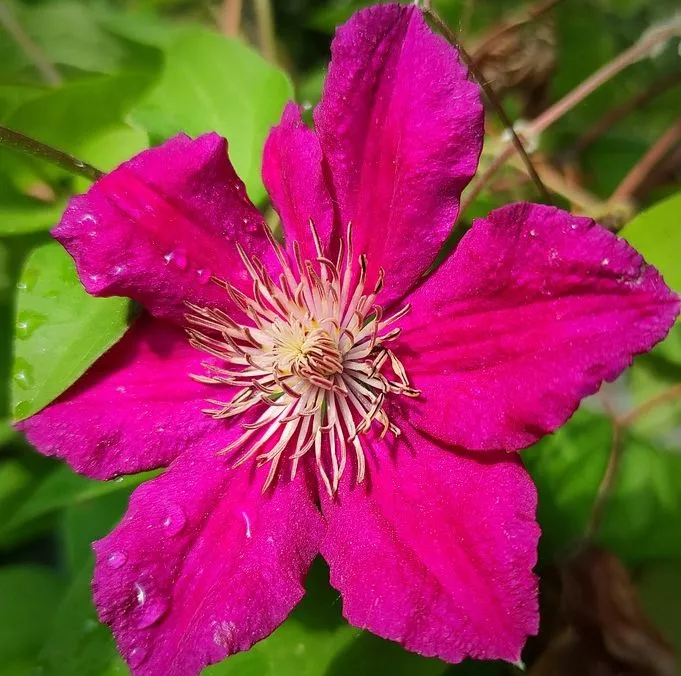
Wrapping Up: Asian Virginsbower Growing & Caring Guide
Asian Virginsbowers are beautiful, flowering vines that can add a lot of interest to your home garden. You can pick from a number of different varieties that will flourish in a range of various soil and lighting conditions. Most Asian Virginsbowers does prefer moisture, so it's best to place their roots in the shade and their faces in the sun.
Latest Updated
- Asian Virginsbower Growing & Caring Guide
- How to Grow and Care for Ponytail Palm (Beaucarnea Recurvata)
- How Much Light Does Ponytail Palm Need Indoors?
- Overwatered Ponytail Palm - Signs & How to Save It
- How to Save Your Underwatered Ponytail Palm
- How To Prune A Ponytail Palm Plant with Simple Steps
- How Can I Make My Ponytail Palms Grow Taller & Faster?
- How to Repot Ponytail Palm - A Guide To Transplant
- How Often to Water Your Ponytail Palm?
- How Big Do Ponytail Palms Get - Does It Need Deep Pots
Popular Articles
- Winter maintenance of Antirrhinum Majus
- How to Grow Terminalia Mantaly Tree
- How to Grow and Care for Crossostephium Chinense
- How to grow Antirrhinum Majus in spring
- Peristeria Elata (Dove Orchid) Profile: Info & Care Guide
- Underwatered Snake Plant (Sansevieria Trifasciata) - Signs And How To Fix
- How to Care for Brazilian Jasmine Plant (Mandevilla Sanderi)
- Rosa Chinensis (China Rose): Plant Growing & Care Tips
- How to Grow & Care for Graptopetalum Purple Delight in Summer
- How to Care for Baby Sun Rose (Aptenia Cordifolia)